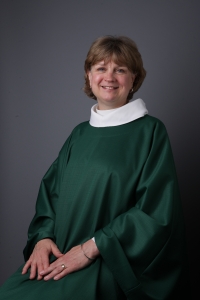Bishop Ann Svennungsen
February 8, 2021
I am not a scientist, though I deeply respect those who are. I am not a business person, but appreciate the challenges they face. I am not an indigenous leader, and in my own whiteness don’t pretend to understand the long arms of injustice and oppression that have reached into Native American communities. I am not a congressional leader, but I respect the desire to serve the common good. These are all vocations to which God calls us and challenges us to do our best.
The vocation I do hold is as a faith leader, the bishop of the Minneapolis Area Synod of the ELCA. And I feel compelled in this vocation to address the construction of the Enbridge Line 3 pipeline.
I feel the responsibility to add my voice because Christianity played a role in how we got here. European exploration, colonization, and exploitation in the mid-15th Century relied critically on the Church’s development of the Doctrine of Discovery. This doctrine condoned efforts by royal governments in Europe to extract the wealth of lands new to them, even at the expense of those who had long peopled those lands. Exploiters were offered absolution by the Church for horrific acts in service to the insatiable drive to find new wealth.
Today I speak while standing on Dakota land. Confessing our sinful participation in this history (and its present reality) is insufficient. We must also change our behavior in ways that have real benefit for the people who have experienced marginalization. That is in fact what repentance means – a change in direction.
A decade ago, the Minneapolis Area Synod in assembly endorsed the United Nations Declaration on the Rights of Indigenous Peoples, agreeing to work with indigenous people to solve issues affecting their communities and preserving their heritage. Soon thereafter the assembly repudiated the Doctrine of Discovery. We recognize we have much to learn about accompanying people for whom we have been complicit in their oppression, and we have chosen to walk humbly on this path.
Knowing we are prone to sinful systems, we return each day to the Gospel that liberates us from sin and “motivates the Church to care for neighbor and earth.”[i] So, our repentance isn’t just words; it requires active engagement. We are at a crossroads from which we can all see clearly our past (if we are willing to) and can ALMOST imagine a different future – one where all people in our state can experience justice and healing.[ii]
We recognize that creation and people are connected through God’s gift of water. Humans are called to be servants of the earth and care for the gift of creation. However, as the prophet Amos reminds us, we often misuse this gift, “treat[ing] the earth as a boundless warehouse and allow[ing] the powerful to exploit its bounties to their own ends.”[iii]
I know the debate around Line 3 construction is complicated. Indigenous peoples do not speak about it with one voice. But the vast majority of indigenous voices I hear are calling us to protect the waters from the possibility of tar sand leakage from pipelines that do not address the real environmental needs for our future. I believe this wisdom must lead us.[iv]
I am also in relationship with other bishops in the state of Minnesota. Many people across the state do not have adequate employment or wages. The pipeline is not ideological for them, it is practical. The disinvestment experienced in our Greater Minnesota communities – including on reservations – is certainly of great concern. I hear the voices of those who are concerned for the economic future of their children and their communities. I ask all of us to listen and take seriously their cries.
And yet, this pipeline is not a long-term solution to this disinvestment. The best antidote to a history of colonization and exploitation is an approach that brings us together to create abundance and mutual support across all corners of our state. I pledge to be a part of solution-seeking on an appropriate distribution of livable wage jobs in our state.
Today, however, our response to this proposed pipeline needs to be clear. It must include active participation, led by the call for the church to be involved in “ending subsidies for economic activities that use up non-renewable natural resources.”[v]
In this effort, many Minneapolis Area Synod congregations are deeply involved. Members of ELCA churches from across the state have stood with Honor the Earth and other groups in opposition to further construction of Line 3. Some congregations have written statements of support for resistance efforts. While there is not unanimity within our synod on this, or any, issue, most church leaders have expressed their concerns for the environmental impact of the Line 3 pipeline and the continued colonization of Native people.
We must together seek an energy future that is not dependent upon fossil fuels that continue to cause harm to ourselves and our planet.
Yes, difficult and complex trade-offs exist in the dynamic processes of economics and the environment. Yet, we don’t have the luxury of sitting on the sidelines. We have to choose between competing claims, conscious of our incomplete knowledge and our own complicity. We acknowledge the sin that clouds all human judgments and actions, and we embrace the grace and forgiveness offered by Jesus Christ.
I believe that we can find a better way forward than the construction of the Enbridge Line 3 pipeline. We come humbly to this place both to be changed through relationship and to seek change and justice for all, so that all people, and perhaps even creation itself, might experience a just and healthy future.
[i] ELCA Social Statement “Church and Society”
[ii] Minnesota Council of Churches effort in “Dismantling the Structures and Repairing the Damage of Racism in Minnesota”
[iii] Amos 5
[iv] Louise Erdrich, Editorial in The New York Times
[v] ELCA social statement “Sufficient, Sustainable Livelihood for All.”
